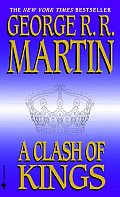
| Series: | Ice and Fire #2 |
| Publisher: | Bantam |
| Copyright: | 1996 |
| Printing: | 2005 |
| ISBN: | 0-553-57990-8 |
| Format: | Mass market |
| Pages: | 1010 |
This is the second book of The Song of Ice and Fire, Martin's giant fantasy series. The books are not self-contained; they're parts of one giant story, carrying plots, characters, and setup between books. Not only do you not want to read this one before A Game of Thrones, you ideally want to have read A Game of Thrones fairly recently so that you remember all of the plot complexity. Martin avoids any extended recaps, which is quite nice when reading the series but might be confusing if you're coming back to it after a while.
My reaction after the first book is even stronger with this one. Martin's story is slow, complex, and sprawling. It's a treat for those who love detailed plotting, intrigue, and political manuevering. Martin gives the politics enough time to develop, shows many of the details, and treats the reader to many camera angles. The primary drawback, though, is that many of the viewpoint characters just aren't interesting.
Last time, Dany, Arya, and Tyrion were the best characters. A Clash of Kings doesn't change that, and if anything their separation from the rest of the pack becomes more noticeable. Jon's story bogs down in an slog through the cold wild north of the Wall, and while I'm sure the people he meets and the things he discovers there are going to be important, they weren't exciting to read about. Catelyn, Sansa, and the newly introduced Davos exist mostly to show additional camera angles on the action and get little characterization of their own (although at least Sansa becomes merely pathetic instead of actively infuriating). Theon (another new viewpoint character) is an idiot. Bran's story develops in some mildly interesting ways, but he spends rather too much time feeling sorry for himself and not enough time exploring the implications of his abilities.
That leaves the three best characters, and they're still a lot of fun. Tyrion is probably the best of this volume, particularly when he starts standing up to and manipulating some of the eviler members of his family. Through the first part of the book, while Arya is on the run and acting more like a typical young girl and Dany is hardly seen at all, I was reading the book mostly for the next Tyrion chapter. His scarcasm was a breath of fresh air.
Arya goes through a rough spot for interest at the beginning of the book, but then eventually gets her feet under her again, meets a fascinating character with his own special powers, and becomes an active part of the plot (finally). When Arya is using her training and acting the most adult, she's my favorite character in the book. She spends a lot of time acting like a young girl, though, and those parts aren't as interesting.
Dany seems to be having the most dramatic effect on the structure of the world, but doesn't get that much screen time (and a lot of that time is rather boring). Her adventures are still in a far different part of the world than everyone else, but it's through her that more magic is coming back into the world. This is never stated outright, but it's becoming obvious as of this book: this series will be more of a fantasy and less of a faux-historical intrigue as the series goes on. Martin is taking the Tolkien approach to magic rather than the D&D approach to magic, keeping it wonderous, unexplained, and mostly found in the form of strange creatures and places of power. That's good to see. Despite the structural similarities (including the over-long novel installments), Martin is trying to keep away from the cliches of epic fantasy and keep matters on a more gritty, if not quite realistic, level.
That being said, I didn't enjoy this book as much as the last, and despite the intricate plotting, I was quite disappointed in the ending. It lacks the thrill and triumph as the end of A Game of Thrones; in fact, there is barely a climax. Much of the last quarter is a recounting of a confused battle and I don't find detailed accounts of faux-medieval combat interesting.
Martin is, admirably, avoiding the standard coming-of-age, growing-power plot structure normally found in fantasy. (There are both coming-of-age stories and growing power, to be sure, but both are just threads of plot, not the center of the tapestry.) Characters either don't gain new abilities or gain them only slowly, and the good guys often lose. This opens the door for a more complex and original work, but it also means that the emotional resonances and dramatic tension that stock fantasy taps into aren't available.
This puts the weight of the story on the details of political intrigue and the interactions between the characters. Martin keeps the story lucid and well-paced, but I often don't find his characters up to the task of carrying my interest. I want more to happen, or more accurately more of true significance rather than a slow building block to a payoff 500 pages later or in the next volume. I also want more to happen to the characters I care about and fewer characters who are little but camera viewpoints. The result is vaguely frustrating and, despite the good pacing, horribly long.
I'm still in this series for at least one more book, probably two. It's staying better than average. But it's not grabbing me and pulling me into the next book.
Followed by A Storm of Swords.
Reviewed: 2006-05-13